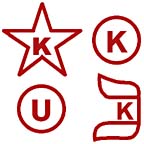
Ifat Sharabi shows off a package of fresh hummus that she stocks in her new store, Mazal's Kosherland, on North King Street in Kalihi. The store carries a full line of kosher products from Israel.
New store follows precepts
of Jewish dietary law
Keeping kosher in the land of surf and sun is more than an act of faith. It's a lifestyle that requires enterprise, determination, lots of scratch cooking and quite a bit of sacrifice.
Certified
Kosher products carry the stamps of various certifying agencies. Some products are also marked "parve," which indicates a kosher product made with no animal products. Vegans often use it as guide in shopping.
Hawaii's lack of a kosher restaurant, dairy or bakery makes the purchase of any processed food a minefield of potential missteps.
But that all got easier four months ago, when Ifat Sharabi, an Israeli ex-patriate, opened the first local kosher grocery, Mazal's Kosherland, named for her grandmother.
At Mazal's you'll find not just gefilte fish, but seven kinds of gefilte fish, plus organic matzos, fresh pickled herring salad and a range of kosher meats and dairy products. Stacks of canned goods, crackers and pickles may not seem that different from what you'd find in a standard supermarket, but they are all certified kosher, which means no worrying that a preservative or a flavoring might contain a derivative of shellfish, say, or gelatin (made of forbidden animal byproducts).
"From my grandma and all the grandmas before her, everybody kept kosher," Sharabi says.
It was a natural part of her life, and she wouldn't consider cooking or eating any other way. "But when I came here it was a big problem."
In Hawaii, limited demand and a small Jewish community mean kosher products receive little space on store shelves. Shoppers learn to search labels for the tiny markings that indicate an item was produced under rabbinical supervision.
But at Mazal's, it's all kosher, all the time, so no more squinting at labels, Sharabi says. "Here, we've eliminated looking with a magnifying glass."
Among products certified kosher are Kikkoman soy sauce, Dole and Del Monte canned fruits, and macadamia nuts from Mauna Loa and Mac Farms.
Jewish dietary law, or kashrut, forbids the eating of pork or shellfish, or the combination of meat and dairy. But that's just the beginning. Methods of preparation, the equipment used and every last ingredient must be kosher, says Rabbi Itchel Krasnjansky of Chabad Lubavitch of Hawaii, an orthodox congregation.
"For example, according to Jewish law you are not allowed to eat the blood of an animal, because the soul of an animal flows through the blood."
Kosher meats and poultry are processed with salt, to draw out the blood. A side benefit, Krasnjansky says, is that the meat is left more wholesome. Likewise, many kosher procedures result in better sanitation or a healthier product, but that isn't the reason for kashrut. It is simply a matter of faith.
The complexities of dietary law are taught in rabbinical college, he says, qualifying rabbis to inspect and certify products and processing plants.
Krasnjansky has been asked to certify plants in Hawaii, for example the Mauna Loa and Mac Farms macadamia nut facilities. This involves a thorough examination of ingredients and equipment. Nothing that touches a non-kosher food can be used in processing a kosher item -- and nothing used to make a dairy product can also be used on meat.
Dietary law is spelled out in the Torah and represents a connection to God, Krasnjansky says. "We serve God not only in the temple on holy days, on special days, but every day, in every interaction that we have, even in the food that we eat."
On the wall of Mazal's Kosherland are clocks showing local and Tel Aviv time, and a board full of "mitzvas," or good deeds posted by customers.
Mazal's Kosherland is a small shop tucked in a strip mall at the corner of North King Street and Dillingham Boulevard. It's behind a KFC and Jiffy Lube and next door to a Canyon Rental.
Modest surroundings, but owner Sharabi says she wanted a central location and didn't want her prices forced up by high rent in a fancy building.
Sharabi moved to Hawaii in 1999 and worked as a bank teller while studying business at Leeward Community College. She quickly determined the need for a kosher grocery. "For the people who keep strictly kosher, it's really hard."
They become adept at mail-order and shop earnestly while traveling, she says. "Every time I went to the mainland on a trip I brought back suitcases of food. That's what everyone's doing."
All her store's products come from Israel through suppliers in Los Angeles and New York. Identifying and contacting them was a feat, and not just because of distance and time differences. "Some big kosher companies don't want to deal with small companies. ... It was quite an undertaking."
Still, Mazal's opened within a year of the day Sharabi says she first set her mind to the plan -- Israeli Independence Day last May.
And she's slowly making additions, including such fresh deli items as falafel sandwiches, melewach (a Yemeni pancake), burekas (a pastry stuffed with potatoes and mushrooms) and Israeli salads.
"It's a great boon for us in the Jewish community here and also for the tourist community," Rabbi Krasnjansky says. Visitors trying to keep kosher on a Hawaii vacation often bring prepared food along and cook for themselves. Mazal's fresh foods and small deli make it possible to actually buy a meal, he says.
"It makes it fun again to come to Hawaii."
Mazal's Kosherland is at 555 N. King St. Hours are 11 a.m. to 9 p.m. Sunday to Thursday, 10 a.m. to 3 p.m. Friday. Call 848-1700.
Click for online
calendars and events.





